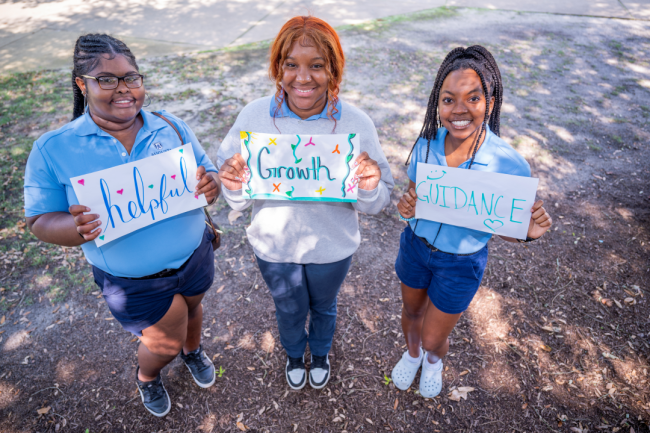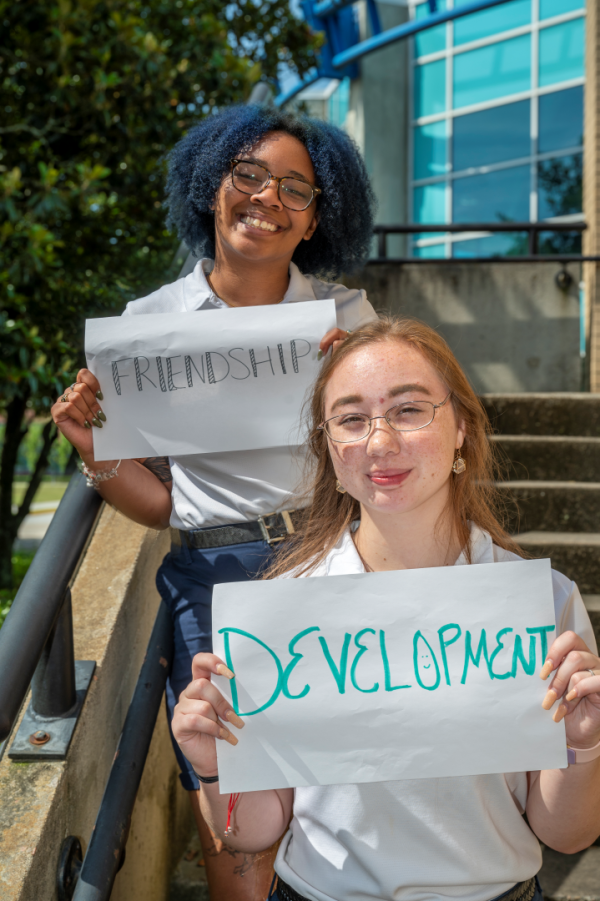You have /5 articles left.
Sign up for a free account or log in.

Augusta University will launch its formal first-year peer-to-peer mentorship program this fall.
Michael Holahan/Augusta University
Mentorship in higher education has long been a high-impact practice in retention and producing student success, but formal programs are lacking.
A 2021 Student Voice survey from Inside Higher Ed and College Pulse found that only one in five students who have a mentor were paired through a formal mentorship program. Among students who did participate in formal mentorship programs, 86 percent were satisfied with their experience.
Starting this fall, incoming students at Augusta University in Georgia can be connected with a peer mentor as part of the Jags4Jags Mentoring Program, the university’s first formal mentorship program.
The background: Augusta officials launched a new strategic enrollment management plan in 2022, with the goal to grow retention 2 percent annually through 2027.
To meet this goal, Amy Abdulovic-Cui, a biology professor and Provost Faculty Fellow, offered the idea of a formal mentoring program.
University officials were always interested in creating a formal, institutionwide peer-to-peer mentoring program but didn’t have the bandwidth.
Successful mentorship initiatives require strategic matching between the mentor and mentee as well as a strong line of communication between the pair, which is a heavy administrative lift, Abdulovic-Cui explains.
To meet this need, Augusta partnered with Mentor Collective to host the mentorship infrastructure in pairing and connecting the mentors. Augusta officials are in control of much of the program, including recruiting and retaining its participants, but Mentorship Collective offers data, analytics and insight to support the work.
This is not the first opportunity Augusta students have for peer mentoring but rather will unify and streamline the experience. Existing programs, like the African American Male Initiative and the Multicultural Mentorship Program will be enveloped into Jags4Jags, offering additional insight, tracking and analytics for mentors and staff.
A present need was demonstrated by this year’s incoming first-year students, who saw their high school education and peer connections disrupted by COVID-19. The Class of 2027’s pandemic losses created the necessary push.
“While mentorship has always been important, we’re also working with a group of students that did not have mentors in school sometimes,” says Mark Myers, director of new student and family transitions. “They were at a computer screen trying just to figure things out.”
How it works: To establish peer mentorships, first Augusta staff recruit current students to be mentors. Students from across the institution of every grade and degree program are eligible to participate. The ideal mentor has some leadership experience and adequate time to devote to assisting a first-year, says Abdulovic-Cui.
The program, at present, has room for around 800 mentees, and Myers hopes by September there will be enough interest to expand offerings.
After signing up, mentors and mentees complete a five-minute survey providing demographic information, hometown, family background, first-gen status, major, club or hobby participation as well as their personal philosophy around mentorship.

Undergraduate and graduate students will serve as mentors to the incoming class of students at Augusta University.
Michael Holahan/Augusta University
Mentors also undergo a 30- to 45-minute training session to prepare them for their role and agree to meet mentorship expectations.
An algorithm then creates pairings, assigning mentors one or two mentees, as designated.
Throughout the mentorship process, meetings will be facilitated by the pair, meaning there’s no requirement for frequency or type of communication. Students are encouraged to interact three times per month, but the general expectation is that mentors will offer guidance and connect students to resources and events as needed and appropriate.
A distinct aspect of the program is the ability for the peer mentor to create alerts for university staff. If a mentee mentions, for example, considering a change in major or needing additional wellness support, the mentor can make a note in the online system. From there, a staff member receives the request and contacts the appropriate department to reach out to the student.
Program recruitment: The university hosted two launch events in the spring term to introduce the topic to its current students and solicit mentors, which will continue throughout the summer, says Susan Davies, vice president for enrollment and student affairs.
In recruiting mentors, Myers and his team intentionally engaged with the entire student population, because “we need to have them reflective of the institution. So that means I had to go into spaces that maybe I, as the recruiter, typically wouldn’t.”
The result has produced a wide variety of mentors in race, sexual orientation, major and other demographics. Graduate and professional students, in particular, have jumped on the opportunity, Davies says.
Over the summer, as students come to campus for orientation, the office of new student and family transitions and orientation leaders are working to sign students up for the program. Parents are also receiving emails encouraging students to sign up.
Staff are placing special emphasis on reaching low-income, first-generation and commuter students with Jags4Jags, as they can be less likely than their peers to feel connected to campus and retain. However, the program is open to all students to ensure there’s no stigma around having a mentor, Davies says.
Tracking effectiveness: Mentorship Collective analyzes the number of contacts made between mentors, referrals made to other departments and overall retention data between terms.
For the first year, the focus will be on creating engaged matches before disaggregating data to identify any groups that might not be involved in mentoring.
Myers will work alongside a graduate assistant to flag nonresponsive mentees, to make sure they’re connected to campus in other ways, if not to their mentor.
Augusta staff will also track mentor satisfaction and retention, because “happy and satisfied mentors will provide a better experience for their mentees,” Myers explains.
Initially, the program will be solely for first- and maybe second-year students, but administrators are considering adding an alumni mentorship opportunity in the future.
If your student success program has a unique feature or twist, we’d like to know about it. Click here to submit.




